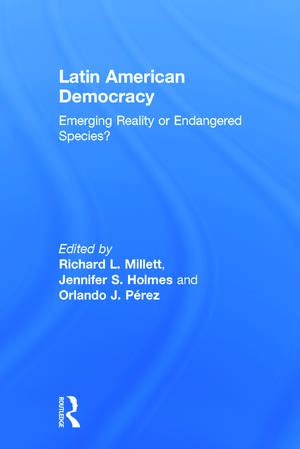Latin American Democracy: Emerging Reality or Endangered Species?
Editat de Richard L. Millett, Jennifer S. Holmes, Orlando J. Pérezen Limba Engleză Hardback – 24 mar 2015
In the second edition of Latin American Democracy contributors – both academics and practitioners, North Americans, Latin Americans, and Spaniards—explore and assess the state of democratic consolidation in Latin America by focusing on the specific issues and challenges confronting democratic governance in the region. This thoroughly updated revision provides new chapters on:
- the environment,
- decentralization,
- the economy,
- indigenous groups,
- and the role of China in the region.
| Toate formatele și edițiile | Preț | Express |
|---|---|---|
| Paperback (1) | 448.49 lei 6-8 săpt. | |
| Taylor & Francis – 25 mar 2015 | 448.49 lei 6-8 săpt. | |
| Hardback (1) | 1114.08 lei 6-8 săpt. | |
| Taylor & Francis – 24 mar 2015 | 1114.08 lei 6-8 săpt. |
Preț: 1114.08 lei
Preț vechi: 1358.64 lei
-18% Nou
Puncte Express: 1671
Preț estimativ în valută:
213.17€ • 222.57$ • 176.43£
213.17€ • 222.57$ • 176.43£
Carte tipărită la comandă
Livrare economică 04-18 aprilie
Preluare comenzi: 021 569.72.76
Specificații
ISBN-13: 9780415732604
ISBN-10: 0415732603
Pagini: 316
Ilustrații: 24 black & white tables, 25 black & white line drawings
Dimensiuni: 152 x 229 x 19 mm
Greutate: 0.59 kg
Ediția:Revised
Editura: Taylor & Francis
Colecția Routledge
Locul publicării:Oxford, United Kingdom
ISBN-10: 0415732603
Pagini: 316
Ilustrații: 24 black & white tables, 25 black & white line drawings
Dimensiuni: 152 x 229 x 19 mm
Greutate: 0.59 kg
Ediția:Revised
Editura: Taylor & Francis
Colecția Routledge
Locul publicării:Oxford, United Kingdom
Public țintă
UndergraduateCuprins
1. Introduction: Democracy in Latin America: Promises and Perils, Section One: The State of Latin American Democracy 2. Democratic Consolidation in Latin America? 3. Measuring Democratic Political Culture in Latin America 4. Latin American Democracy: The View from the South. The United States and the OAS: What Frustrates the Americans? 5. Latin American Democracy: The View from the South.6. The Rule of Law in Latin America Section Two: The Status of Institutions 7. Executive-Legislative Relations and Democracy in Latin America 8.Women and Politics in Latin America 9. Decentralization and Local Government in Latin America 10. The State, the Military and the Citizen: New Security Challenges in Latin America11. Democracy and Populism in the Andes: A Problematic Coexistence Section Three: Domestic and Regional Issues 12. Indigenous Mobilization and Democracy in Latin America13. Crime and Citizen Security: Democracy’s Achilles Heel14. Economic Development and Democracy in Latin America.15. Democratic Governance and Corruption in Latin America16. Chinese Influence on Latin America: Challenges and Opportunities 17. Conclusion. Slow Progress and False Promises.
Notă biografică
Richard L. Millett is professor emeritus at Southern Illinois University-Edwardsville and Vice President of the American Committees on Foreign Relations.
Jennifer S. Holmes is a professor and Head of Public Policy, Political Economy and Political Science at the University of Texas at Dallas.
Orlando J. Pérez is associate dean of the School of Humanities and Social Sciences at Millersville University. He is a member of the Scientific Support Group for the Latin American Public Opinion Project (LAPOP) at Vanderbilt University and directs the Americas Barometer survey in Panama.
Jennifer S. Holmes is a professor and Head of Public Policy, Political Economy and Political Science at the University of Texas at Dallas.
Orlando J. Pérez is associate dean of the School of Humanities and Social Sciences at Millersville University. He is a member of the Scientific Support Group for the Latin American Public Opinion Project (LAPOP) at Vanderbilt University and directs the Americas Barometer survey in Panama.
Recenzii
"Millett, Holmes and Pérez have undertaken a major revision of their widely read first edition. This new edition offers new material on the environment, decentralization, the economy, indigenous groups and the growing role of China in Latin America. The product is a cohesive volume that provides a comprehensive analysis of recent trends away from democratization. It is written by the top scholars in the field and does an excellent job of looking at topics from both the perspective of the North and that of the South. Unlike other treatments, which focus narrowly on state institutions, this volume goes far beyond that limited perspective and includes such important issues as political culture, populism, crime, corruption, civil-military relations, human rights, the media, and more. A continued must read for scholars, students, and policy makers."
—Mitchell A. Seligson, Centennial Professor of Political Science, and Director of the Americas Barometer, Vanderbilt University
This comprehensive, edited volume contains chapters on all the usual themes in the political development and democracy literature. Chapters cover the roles of political culture, the military, presidentialism, indigenous movements, the representation of women, the strength of institutions, corruption, crime, inequality, governance, and populism. ...Overall, this is a thorough overview of past and current research on the democratic transition and consolidation throughout Latin America.
--L. M. Barnett, Our Lady of the Lake University
—Mitchell A. Seligson, Centennial Professor of Political Science, and Director of the Americas Barometer, Vanderbilt University
This comprehensive, edited volume contains chapters on all the usual themes in the political development and democracy literature. Chapters cover the roles of political culture, the military, presidentialism, indigenous movements, the representation of women, the strength of institutions, corruption, crime, inequality, governance, and populism. ...Overall, this is a thorough overview of past and current research on the democratic transition and consolidation throughout Latin America.
--L. M. Barnett, Our Lady of the Lake University
Descriere
The second edition of Latin American Democracy maintains the mix of practitioners and academic that composed the first edition. Contributors from both North and Latin America explore and assess the state of democratic consolidation in Latin America by focusing on the specific issues and challenges confronting democratic governance in the region.













